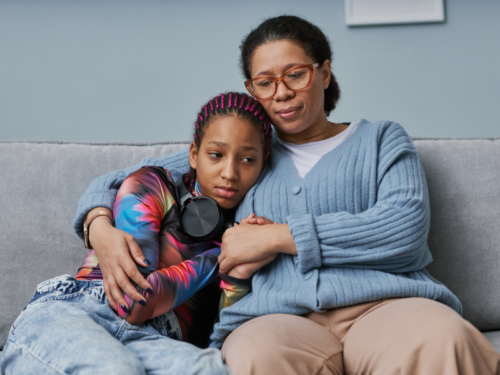
Table of Contents
How to Help a Friend With Depression
Written By: Charlie Health Editorial Team
December 10, 2021
7 min.
While mental health diagnoses affect a significant amount of people, depression in particular can be vastly misunderstood. Help educate others on depression and mental health.
Learn more about our Clinical Review Process
Table of Contents
Depression is vastly misunderstood. Depressive disorders involve much more than low moods or feelings of sadness. Left unchecked, they can leave individuals debilitated by an onslaught of psychological and physical symptoms. According to the National Institutes of Mental Health, major depression is one of the most common mental health disorders in the United States, affecting nearly eight percent of U.S. adults. Meanwhile, depressive disorders are on the rise among adolescents and young adults, with 13 percent of U.S. teens aged 12–17 experiencing a major depressive episode in 2017.
Depression can cause a loss of interest in things a person used to enjoy, decreased pleasure, feelings of guilt and low self-esteem, disturbed sleep or appetite, and poor concentration. Although the stigma surrounding mental health has lessened in recent years, it remains a significant reason why individuals with depression hesitate to seek professional help.
With that said, early intervention is important, as depression can take lives. Suicide was the second leading cause of death among adolescents and young adults in 2019, and suicide rates among teens have steadily increased over the last decade. If you have a close friend or a loved one with depression, here’s how to support them as they navigate their mental health struggles.
Join the Charlie Health Library
Get mental health updates, research, insights, and resources directly to your inbox.
You can unsubscribe anytime.
Educate Yourself on Depressive Disorders
Whether your friend has been officially diagnosed with major depressive disorder or you think they might be experiencing symptoms of depression, it's important to educate yourself. If you're not sure where to start, try reading journals and studies about teenage depression to learn more about the signs and symptoms of depression.
It's important to remember that the symptoms of depression often look different in adolescents and young adults than in older adults. Some red flags that your friend might be experiencing depression symptoms include:
- Irritability, anger, or hostility: Your friend's predominant mood might be irritability, as opposed to sadness. It's common for depressed teenagers to seem grumpy, hostile, easily frustrated, or prone to angry outbursts.
- Unexplained aches and pains: Constant complaints of aches and pains, such as chronic headaches and stomach aches, may be a sign of depression. With that said, physical problems may be caused by an underlying medical condition, so it's important to get a physical exam.
- Extreme sensitivity to criticism: It's common for young people who are depressed to experience low self-esteem, feelings of worthlessness, and hopelessness. In turn, these feelings can make them more vulnerable to criticism, rejection, and failure.
- Withdrawing from some, but not all people: Depressed teenagers typically maintain some of their friendships, while older adults tend to isolate themselves. However, depressed teenagers are also known to socialize less, withdraw from their parents, and start hanging out with a new crowd.
Although mental health issues can affect anyone regardless of their gender, age, ethnicity, or income level, some people are more prone to depressive disorders than others. Depression can be caused by biological factors (genetics, experiencing physical illness or injury, or seasonal affective disorder), psychological or social factors (childhood experiences or a recent breakup), or life-changing events (pregnancy or the loss of a loved one). Additionally, individuals with chronic illnesses face an increased risk of depression.
Even though you're educating yourself on depression, remember that you're not an expert. Don't try to tell your friend how to cure their mental health issues. Although lifestyle changes, like regular exercise and a healthy diet, can help some people, it's not enough for everyone. Some people with depressive disorders may need cognitive-behavioral therapy (CBT), medication, or other forms of treatment for their mental wellness.
Listen to them
Now that you're familiar with the signs and symptoms of depression, it's time to show your friend how much you support and appreciate them. Remember: How you communicate is just as important as what you communicate.
When talking with your friend, focus on listening to what they have to say, and avoid lecturing them about treatment options. Be patient and gentle, and remember that it can feel incredibly overwhelming for people to talk about feelings of depression. Encourage your friend to reach out if they're feeling down, and try to keep them engaged with active listening techniques:
- Ask open-ended questions to find out how they're feeling instead of assuming you understand what they mean.
- Validate their feelings. You might say, "I'm so sorry you're feeling that way. That sounds really difficult."
- Show empathy and interest with your body language (leaning forward, maintaining eye contact, nodding in agreement).
It's essential to acknowledge their feelings, even if they might seem irrational. In the end, trust your gut. If your friend won't open up to you, but you feel like something is going on, consider reaching out to a trusted adult, such as a school counselor, teacher, parent, or mental health professional.
Showing your unconditional support, reminding your friend how much they mean to you, and sticking around when times get tough are key. Even if your friend has a hard time communicating their feelings, talking regularly will help you build a stronger relationship. They might not feel like talking the first time you ask, so it can help to continue telling them how much you care.
Encourage your friend to seek support

Your friend might not be aware that they're experiencing depression—or they might feel so overwhelmed that it's hard to reach out for support. Even if they know therapy could help, it might feel intimidating to open up to their parents about their mental health. If your friend seems interested in counseling, offer to help them review their treatment options and start the conversation with a trusted adult. You can help your friend list conversation points and things to mention in their first therapy session.
Some mental health resources for individuals with depression include:
- Talking to a healthcare professional: If your friend doesn't feel comfortable opening up to their parents, they might feel comfortable talking to their primary care doctor. If appropriate, their primary care doctor (or another trusted health care provider) can refer them to a mental health specialist for professional help, guidance, and depression treatment.
- Joining a peer support group: Support groups can be valuable resources for individuals with mental health conditions. They provide a great source of social support, giving individuals the opportunity to share their experiences and learn helpful tips for coping with depression. The National Alliance on Mental Illness (NAMI) offers various support group resources, including peer support groups and support groups for family members.
- Helplines: If your friend is having a mental health crisis, they can call the National Suicide Prevention Lifeline at 988 or text the Crisis Text Line at HOME to 741741. If you're afraid that your friend might harm themselves, call 911.
Support them during treatment
Sometimes, talk therapy can bring up negative feelings and emotions that will leave your friend feeling drained. On bad days, they might not feel like leaving the house—or it might be tempting to skip a counseling appointment. If they say something like, "I think I'm going to cancel my appointment," encourage them to stick with it. You might say, "You said you felt a lot better after your therapy session last week. What if today's session helps, too?"
The same goes for medication. If your friend talks about stopping their antidepressants or other medications prescribed by their care team, be supportive, but encourage them to talk to their psychiatrist about switching prescriptions or trying other treatment options.
Ultimately, it's important to be patient. Remember that depression treatment is not always linear, and setbacks will happen along the way.
Do you need more support with
your mental health?
Charlie Health can help.
Take care of yourself
When a close friend or loved one has depression, it's tempting to drop everything to show your unconditional support. To be the best friend that you can be, you'll need to take care of your own needs first. If you put all your energy into supporting your friend, you won't have any energy left for yourself. And if you're constantly feeling burned out or overwhelmed, you won't be able to support your friend.
The first step toward taking care of yourself is setting boundaries. For example, you might let your friend know that you're available to talk after class, but not before then. If you're concerned about them feeling like they can't reach you, consider creating a contingency plan so they can contact you in case of an emergency. Try getting other friends involved to help them create a bigger social support network.
While supporting your friend, don't forget to practice self-care. Spending a lot of time with someone who has depression can take a toll on your mental health. Make sure you take time to recharge so you can give your mind and body the opportunity to relax.
Contact us
At Charlie Health, our intensive outpatient program helps teens and young adults navigate their mental health challenges in a safe, supportive environment. With our innovative online therapy service, individuals with depression and their family members can experience the benefits of in-person therapy from the comfort of their homes.
Whether you're experiencing mild depression symptoms or you've been diagnosed with a mental health condition, our compassionate, experienced team of clinicians is here to support you every step of the way. Taking that first step can feel overwhelming, but getting the help you need will make life so much brighter. Reach out today.





